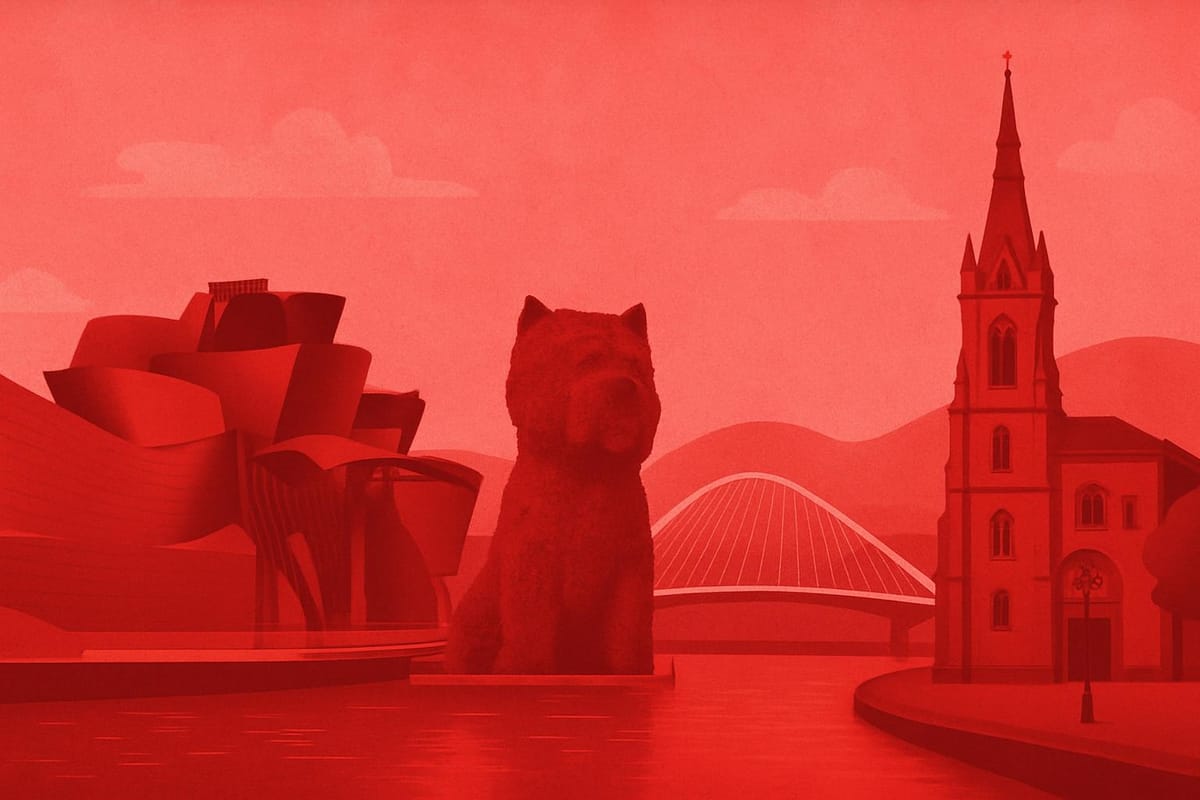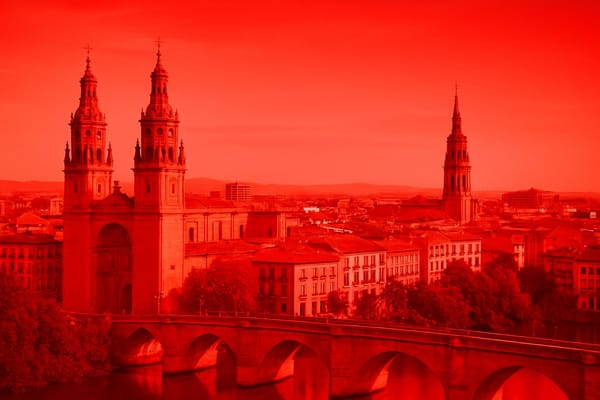Bilbao
Guggenheim Museum, pintxos, Old Town & riverside bridges, modern architecture, Basque culinary flair

Important things to know about Bilbao
Bilbao, Spain, is a dynamic city in the Basque Country that blends its industrial past with a forward-looking urban identity, offering a living example of urban transformation and resilience; once dominated by shipbuilding and heavy industry, Bilbao reinvented itself through investment in infrastructure, cultural vitality and a diversified economy that now includes services, technology, logistics and a thriving creative economy, all while preserving traces of its industrial heritage in the fabric of neighborhoods and streets. The Nervión river threads through the city, shaping a compact, walkable center where modern architecture and traditional Basque culture coexist, and where local languages - Euskera and Spanish - give the city a distinct linguistic and social texture that enriches everyday life. Residents and visitors alike notice Bilbao’s emphasis on quality of life: efficient public transport, accessible green spaces, and a lively culinary scene that celebrates local produce and gastronomy without relying on spectacle; food culture here is as much about convivial markets and family recipes as it is about innovation. The city’s economy benefits from its port and strategic position in northern Spain, connecting regional industry to broader European and global markets, while municipal planning prioritizes sustainability, pedestrian-friendly streets and cultural programming that supports local artists and small businesses. Bilbao’s climate, with temperate Atlantic influences, and its mix of modern and traditional lifestyles contribute to a cosmopolitan yet rooted atmosphere, making the city a model for adaptive urban development in the Basque region of Spain.
Sightseeing hot-spots in Bilbao
Bilbao is a dynamic gateway to the Basque Country, where historic neighborhoods and bold contemporary architecture meet along the Nervión River. At the heart of the city, the Guggenheim Museum reshaped Bilbao’s international profile with its shimmering titanium curves, making the museum itself one of the most photographed architectural landmarks in Spain. Visitors who come for the museum often discover a lively riverfront promenade, striking footbridges like the Zubizuri, and waterside sculptures that invite relaxed strolls and memorable photos.
Exploring the Casco Viejo, or Old Town, brings a contrasting experience of narrow lanes, traditional shops and bustling markets where the Basque spirit is palpable. This area is a top spot for sampling authentic pintxos in cozy taverns, and cultural sites such as the Bilbao Fine Arts Museum and the historic cathedral are just a short walk away. The blend of old and new makes sightseeing in Bilbao rewarding for travelers seeking art, gastronomy and local life, and guides or walking tours often weave these elements into a compact, enriching itinerary.
Beyond the central attractions, Bilbao’s cultural calendar and modern venues like the Euskalduna concert hall add layers of musical and theatrical appeal for visitors. Easy public transport connects to panoramic viewpoints and nearby green spaces where you can see the city from above, while football fans may include San Mamés Stadium on their route. Whether your priority is museums, food, or scenic riverfront architecture, Bilbao delivers a memorable European city-break experience that highlights the best of the Basque Country.
Hotels to enjoy in Bilbao
Bilbao’s hospitality scene blends contemporary style with Basque tradition, offering a wide range of hotels in Bilbao to suit every traveler. From design-forward boutique properties tucked into the narrow streets of Casco Viejo to sleek riverfront hotels along the Nervión, visitors can find Bilbao hotels that put the Guggenheim Museum, Euskalduna Palace, and lively dining neighborhoods within easy walking distance. Business travelers appreciate modern conference facilities and quick links to Bilbao Airport, while couples and culture seekers favor stays that highlight local Basque cuisine and art-filled interiors. Whether searching for luxury suites with panoramic views, mid-range comforts with free Wi‑Fi and breakfast included, or budget-friendly rooms near metro stops in Abando, the city’s lodging offers a welcoming base for exploring the Basque Country.
Choosing the right Bilbao accommodation means thinking about location, amenities, and the experience you want: river views and rooftop terraces for romantic getaways, soundproofed rooms for business trips, and family-friendly options with extra space and convenient parking. Many hotels emphasize sustainability and local design, integrating Basque materials and tasting menus that showcase pintxos and seasonal seafood. Advanced booking can uncover special rates and flexible cancellation, and comparing neighborhood vibes-historic quarters, modern commercial zones, or artsy riverside promenades-helps match expectations. With a smart selection of hotels in Bilbao, visitors can enjoy efficient transport connections, rich cultural programming, and comfortable stays that enhance every itinerary in this dynamic northern Spanish city.
Restaurants to try in Bilbao
Bilbao’s dining scene is a vibrant blend of tradition and innovation, making the restaurants of Bilbao, Spain a must-visit for food lovers. In the heart of the city, the Casco Viejo and the area around the Guggenheim offer a rich selection of pintxos bars, seafood taverns and contemporary eateries where Basque cuisine shines. Visitors can stroll along the Nervión River and find riverside restaurants serving freshly caught fish, or duck into narrow streets for small plates paired with local txakoli or cider. The culinary identity of Bilbao is built on local produce, seasonal ingredients and a deep respect for technique, so whether you seek casual tapas experiences or elegant tasting menus, Bilbao’s restaurants deliver authentic flavor and creativity.
From humble pintxos counters to Michelin-starred and chef-driven venues, the variety of Bilbao restaurants caters to every palate and budget, helping the city rank among the top gastronomic destinations in the Basque Country. Food markets and intimate wine bars add to the appeal, while modern chefs reinterpret classic recipes, highlighting Basque traditions with contemporary flair. For travelers searching for memorable meals, exploring the restaurants of Bilbao offers both culinary discovery and cultural immersion: book ahead for popular spots, try a mix of pintxos and fine dining, and savor the region’s seafood, charred peppers, and silky desserts that define this lively Spanish city.
Best shopping stops in Bilbao
Bilbao is a vibrant destination for shopping in Bilbao that blends contemporary style with traditional Basque charm. Strolling through the Casco Viejo (Old Town) you’ll find narrow streets lined with independent boutiques, artisan shops and charming stores selling leather goods, handmade ceramics and local textiles. The famous Mercado de la Ribera offers a sensory feast where shoppers can pick up premium Basque products like cured ham, cheeses and gourmet preserves while soaking up the city’s atmosphere. For those seeking international and Spanish brands, Gran Vía and the modern avenues around Moyúa host flagship stores, department stores and sleek fashion outlets that make Bilbao shopping ideal for fashion-savvy visitors.
Beyond fashion and food, Bilbao’s shopping highlights include innovative concept stores and galleries near the Guggenheim Museum that showcase local designers and contemporary crafts, making it a hub for unique souvenirs and design-oriented finds. Shoppers looking for value and variety will appreciate El Corte Inglés and the city’s mix of high street and niche retailers, while evening pintxo-hopping rewards you with both culinary delights and boutique discoveries. Whether you’re searching for luxury, authentic Basque crafts, or the latest Spanish labels, shops in Bilbao deliver a memorable blend of culture, quality and style in Bilbao, Spain.
Nightlife highlights in Bilbao
Bilbao transforms after dusk into a vibrant playground where the Bilbao nightlife buzzes along the Nervión River and through the narrow streets of Casco Viejo. Evenings often start with a crawl of pintxos bars, where locals and visitors mix over small plates and txikitos of wine; the flavors of the Basque Country make snacking as much a social ritual as a meal. Around the iconic Guggenheim, modern bars and chic terraces offer cocktails with views of illuminated architecture, while tucked-away taverns serve traditional cider and convivial conversation. The city's compact layout means hopping between venues is easy, encouraging spontaneous discoveries and a friendly, communal vibe that defines Bilbao after dark.
For those seeking music and dancing, live venues and intimate jazz clubs populate neighborhoods beyond the tourist trail, bringing a lively mix of Spanish, Basque and international sounds to the late-night scene. Energetic nightclubs keep the party going into the early hours, and seasonal festivals add extra sparkle with street performances and DJ sets that spill into plazas. With efficient transport links and a reputation for safety, Bilbao nightlife attracts both night owls and culture lovers looking to pair musical nights with culinary delights, ensuring memorable evenings whether you’re on a weekend break or a longer stay.
Getting around in Bilbao
Bilbao’s transportation hub is easy to navigate whether you arrive by air or rail: Bilbao Airport (BIO), located in Loiu about 12 km from the city centre, offers regular flights across Spain and Europe and is well served by airport buses, taxis and convenient car hire options for seamless airport to city transfers, while the rail network centers on the main Bilbao-Abando train station where RENFE long-distance and regional services connect the Basque Country with Madrid, Santander and other major Spanish cities; local mobility is strengthened by the Cercanías commuter trains and Euskotren narrow-gauge services that link coastal towns and suburban areas, all integrated with the efficient metro and tram systems so travelers can move quickly from terminals to central attractions, business districts and the port, making Bilbao’s combined airport and train situation particularly attractive for tourists and business visitors seeking fast, reliable connections and easy access to the city’s cultural highlights.
Culture must-see's in Bilbao
Bilbao’s cultural heartbeat pulses through a rich mix of Basque traditions and contemporary innovation, centered around icons like the Guggenheim Museum Bilbao and the revitalized banks of the River Nervión. Visitors discover an architectural feast from Frank Gehry’s titanium curves to the classical dignity of the Arriaga Theatre and the Euskalduna Palace, while neighborhood life thrives in the cobbled lanes of Casco Viejo where the Basque language (Euskara) is heard alongside Spanish. The city’s museums, including the Bilbao Fine Arts Museum, offer collections that trace local history and international movements, and public art is woven into plazas and riverside promenades, making culture accessible at every turn.
Gastronomy and festivals animate Bilbao’s streets, with world-class pintxos, bustling markets like La Ribera, and the local txakoli wine shaping social rituals from casual tapas crawls to celebratory nights during Semana Grande. Sports and music add to the mosaic: San Mamés stadium and intimate live-music venues host events that bring together residents and visitors, while contemporary creativity thrives in galleries and cutting-edge design shops. Whether exploring museums, savoring culinary traditions, or watching the sunset glint off the Guggenheim’s metal panels, Bilbao presents a dynamic cultural landscape where tradition and modernity coexist in vibrant harmony.
History of Bilbao
Bilbao has its roots in medieval maritime commerce, officially founded in 1300 with privileges granted by the lord of Biscay, and grew out of a strategic position on the Nervión River that linked the Basque hinterland to the Bay of Biscay. From its Old Town and bustling medieval port evolved a city shaped by centuries of trade in iron, wool and shipbuilding. The arrival of the Industrial Revolution in the 19th century transformed Bilbao into one of Spain’s leading industrial hubs: mines, steelworks and shipyards proliferated along the estuary, while railways and docks multiplied the city’s wealth and population. This era left a strong imprint on Bilbao’s urban fabric-warehouse-lined quays, industrial architecture and workers’ neighborhoods-forming the backbone of its industrial heritage and social history. Throughout these changes, the Basque identity and language persisted, and the city balanced commercial ambition with local traditions, giving Bilbao a distinctive blend of Basque Country culture and Atlantic mercantile influence that shaped its civic institutions, festivals and culinary reputation.
The late 20th century brought deindustrialization, environmental challenges and economic decline, but it also set the stage for dramatic urban regeneration that would redefine Bilbao’s global image. Starting in the 1990s, ambitious public-private projects focused on cleaning the river, reclaiming former industrial land and investing in culture and architecture as engines of renewal. The opening of the Guggenheim Museum in 1997 became an international turning point-an iconic building that catalyzed tourism, investment and a broader cultural revival often called the “Bilbao Effect.” Subsequent projects, from the Zubizuri footbridge to the Euskalduna Palace and Norman Foster’s metro stations, reinforced Bilbao’s reputation for innovative architecture and sustainable urban planning. Today Bilbao, Spain, balances modern amenities and global cultural attractions with preserved neighborhoods like the Casco Viejo, a thriving culinary scene rooted in Basque gastronomy, and continued respect for its industrial past. The history of Bilbao is therefore a story of transformation-from medieval port to industrial powerhouse to celebrated model of urban renewal-making it a compelling destination for history, culture and architecture enthusiasts alike.



